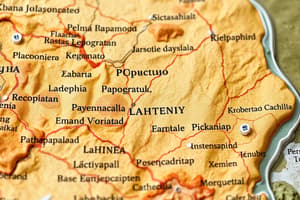Podcast
Questions and Answers
Какой источник энергии в России является наиболее значимым для производства электроэнергии?
Какой источник энергии в России является наиболее значимым для производства электроэнергии?
- Нефть
- Ядерная энергия
- Уголь
- Натуральный газ (correct)
Какие компании являются крупнейшими участниками нефтяной отрасли в России?
Какие компании являются крупнейшими участниками нефтяной отрасли в России?
- Transneft и Tatneft
- Surgutneftegas и Bashneft
- Gazprom и Lukoil
- Rosneft и Gazprom Neft (correct)
Какие возобновляемые источники энергии набирают важность в России за последние годы?
Какие возобновляемые источники энергии набирают важность в России за последние годы?
- Гидроэнергия и биомасса
- Геотермальная энергия и морские приливы
- Ветроэнергия и солнечная энергия (correct)
- Ядерная энергия и гелиосистемы
Какой вид энергетической компании пережил спад производства из-за международных санкций и внутреннего потребления?
Какой вид энергетической компании пережил спад производства из-за международных санкций и внутреннего потребления?
Какой вид энергии обеспечивает примерно две трети импорта газа в Европу из Москвы?
Какой вид энергии обеспечивает примерно две трети импорта газа в Европу из Москвы?
Какая компания ответственна за примерно 80% рынка в России?
Какая компания ответственна за примерно 80% рынка в России?
В каких регионах России развиваются ветряные фермы?
В каких регионах России развиваются ветряные фермы?
Какую сумму обещала выделить Германия на строительство газопровода Nord Stream 2?
Какую сумму обещала выделить Германия на строительство газопровода Nord Stream 2?
Какую характеристику можно дать для исторической энергетической политики России?
Какую характеристику можно дать для исторической энергетической политики России?
Какое направление принимает современная энергетическая политика России?
Какое направление принимает современная энергетическая политика России?
Flashcards are hidden until you start studying
Study Notes
Unraveling Russia's Energy Landscape
Russia is a global powerhouse when it comes to fuel production and energy supply. This comprehensive overview will delve into various facets of its energy complex, spanning across electricity generation, hydrocarbon industries, natural gas, renewables, and governmental initiatives.
Electricity Generation
The Russian Federal Grid Company manages the nation's vast electrical infrastructure, which primarily relies on thermal power plants burning coal, natural gas, or oil for electric generation. Hydropower stations also contribute significantly along with nuclear facilities like those in Leningrad Oblast and Kaliningrad Region. Renewable sources such as wind and solar have been growing in importance during recent years.
Oil Industry
Oil has played a pivotal role in shaping modern Russia. As of the early twenty-first century, it accounts for one quarter of GDP while export earnings approach half of total national income. Major players within this segment include state-owned giants like Rosneft and Gazprom Neft, alongside private entities like Surgutneftegas and Bashneft. Crude output reached nearly 11 million barrels per day by late 2021 before declining slightly due to international sanctions and rising domestic consumption.
Natural Gas Sector
Natural gas occupies a vital position in today's Russian economy, providing approximately two thirds of Europe's imports from Moscow. Key companies, such as Gazprom – itself responsible for around 80% market share within Russia - continue to dominate this arena despite western efforts aimed at diversifying European dependency upon them through alternative suppliers and pipelines.
Renewable Energy Sources
In response to environmental concerns and international trends towards sustainable growth, Russia has embarked upon increasing investments in green technologies over the past decade. Wind farms are developing expeditiously in regions such as Krasnodar Territory, Volga Federal District and Far East, whilst solar panels are proliferating throughout southern districts including Astrakhan, Dagestan and Chech Republic, among others. A concerted effort is underway to transform this burgeoning niche into reliable sources representing a considerable portion of overall energy mix.
Energy Policies
Historically, Russian energy policy was characterized by aggressive expansionism, with the premise being to extend influence via resource exports, specifically fossil fuels, both across Eurasia and beyond. However, contemporary strategies reflect a shift towards sustainability goals encompassing cleaner production methods and the exploration of new markets for exports. International collaboration provides further opportunities for economic benefit; Germany has committed €9 billion to construct Nord Stream 2, an ambitious pipeline project intended to deliver enormous quantities of Russian gas directly beneath the Baltic Sea to German consumers.
As the world continues to evolve, so too does Russia's energy landscape. From an industrial giant almost wholly dependent on traditional resources, the country now discovers fresh potential within emerging sectors such as renewables, fostering strategic partnerships globally whilst maintaining robust control of established pillars of crude oil and natural gas production.
Studying That Suits You
Use AI to generate personalized quizzes and flashcards to suit your learning preferences.




